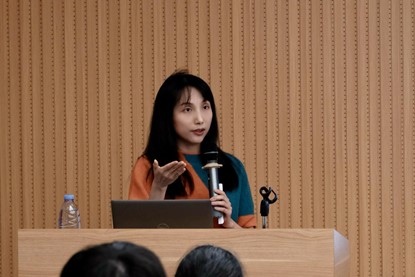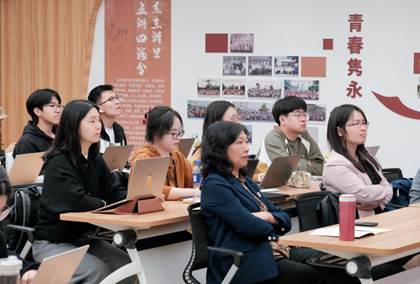On the evening of October 25, 2024, Dr. HUANG Yan, Head of Department of Applied AI at Cambridge University Press & Assessment (CUP&A), was invited to deliver an engaging lecture titled “Advancements in AI for Language Assessment” at East-5 Qinghe Bar for the faculty and students of the School of International Studies (SIS). The lecture was moderated by Professor MIN Shangchao, Vice Dean of SIS.

Dr. HUANG Yan used to be an outstanding undergraduate and master student of Chu Kochen Honors College and the School of International Studies, Zhejiang University. She also holds a Ph.D. in Natural Language Processing (NLP) from the University of Cambridge and has made significant achievements in the field of language testing and assessment. Currently, she serves as Head of Department of Applied AI at Cambridge University Press & Assessment (CUP&A), where she is responsible for the development of AI technologies for a series of Cambridge English products, including Cambridge English Qualification, Linguaskill, and Upskill. With 14 years’ experience in machine learning (ML) and NLP, she has published over ten high-quality papers in top journals and conferences in the fields of NLP, corpus linguistics, and applied linguistics.
At first, Dr. HUANG introduced the specific areas of artificial intelligence technology developed by her department, including automated scoring, confidence modeling, anomaly response monitoring, and automatic speech recognition, as well as the Cambridge language testing and learning products that have applied these technologies. Besides, she shared the latest research findings from Department of Computer Science and Technoogy, Department of Engineering of the University of Cambridge, which have collaborations with her department. She emphasized it is crucial to facilitate knowledge exchange and explore which directions worth further research even though these conceptual and laboratory-based studies are not technologically mature for product development The dissemination of these academic accomplishments offered valuable insights to the faculty and students present, enriching their future research endeavors.

Dr. HUANG subsequently provided an analysis of various artificial intelligence terms, ranging from AI and ML to the currently trending Large Language Models (LLMs) and Generative AI. She clarified the meanings of these concepts from a professional standpoint and highlighted the interrelationships among them. For instance, she explained that LLMs are a specialized subset of Generative AI, concentrating on the processing and generation of human language and text, and are capable of executing a broad spectrum of NLP tasks. Dr. HUANG then traced the evolution of NLP technology schools as well as their features and limitations, from rule-based systems in the 1950s to the current LLMs, through a chronological analysis. She underscored the significance of choosing the right technology based on the specific problem at hand, rather than just following the popularity of a particular technology. Furthermore, Dr. HUANG explored the practical applications of AI in language assessment, focusing on item generation, item calibration, and scoring. She noted that it is crucial to consider the characteristics of various models, and to select and apply them in accordance with the specific risks, scale, and objectives of the assessment while applying AI technology, especially in automatic scoring.
At the end of the lecture, Dr. Huang concluded her presentation with an outlook on the application of AI in language assessment research. She proposed that future research could explore topics such as the development of interactive oral testing tasks and evaluation frameworks, new language constructs, and the application of comprehensive tasks in assessment and learning. She also emphasized the importance of validity verification research in AI-empowered foreign language testing and evaluation.
In the interactive Q&A session, teachers and students posed many insightful and valuable questions to Dr. HUANG on their research directions, and engaged in lively discussions and exchanges. Dr. HUANG answered the questions and shared her own experiences and insights. Her meticulous and professional explanations, as well as her easy-going and humorous personality, won warm applause and high praise from the attendees.
Text/Photos: Hong Shichen/Wang Yanxin
Institute of Linguistics and Applied Linguistics in Foreign Languages, Zhejiang University
Research Center for Language Development and Assessment, Zhejiang University



